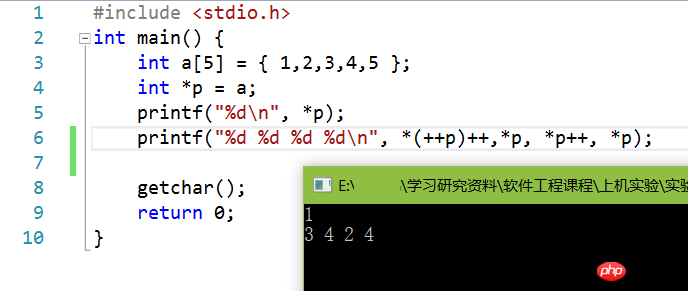1. The parameters of the prinf function contain pointer expressions. In what order are they calculated? The result of the code operation is obviously not from left to right.
#include <stdio.h>
int main() {
int a[5] = { 1,2,3,4,5 };
int *p = a;
printf("%d\n", *p);
printf("%d %d %d %d\n", *(++p)++,*p, *p++, *p);
getchar();
return 0;
}
给我你的怀抱2017-06-27 09:20:57
Changing a variable multiple times in one statement is undefined behavior and may have different results on different platforms. This question makes no sense.
学习ing2017-06-27 09:20:57
printf{"%d",++i} represents two operations
First execute i=i+1, then output i
And i++ means
First output, then execute i=i+1
某草草2017-06-27 09:20:57
The order of operation of function parameters has little to do with the internal logic of the function. It should calculate ++p before pushing it onto the stack (before the function is executed), and then calculate p++ after the function ends. If you want to know the specific sequence, you can refer to the assembly code (the specific meaning will be updated tomorrow, sorry)
.file "a.cpp"
.def ___main; .scl 2; .type 32; .endef
.section .rdata,"dr"
LC0:
.ascii "%d1
3 2 1 1
"
LC1:
.ascii "%d %d %d %drrreee"
.text
.globl _main
.def _main; .scl 2; .type 32; .endef
_main:
LFB10:
.cfi_startproc
pushl %ebp
.cfi_def_cfa_offset 8
.cfi_offset 5, -8
movl %esp, %ebp
.cfi_def_cfa_register 5
pushl %esi
pushl %ebx
andl $-16, %esp
subl , %esp
.cfi_offset 6, -12
.cfi_offset 3, -16
call ___main
movl , 40(%esp)
movl , 44(%esp)
movl , 48(%esp)
movl , 52(%esp)
movl , 56(%esp)
leal 40(%esp), %eax
movl %eax, 60(%esp)
movl 60(%esp), %eax
movl (%eax), %eax
movl %eax, 4(%esp)
movl $LC0, (%esp)
call _printf
movl 60(%esp), %eax
movl (%eax), %ebx
movl 60(%esp), %eax
leal 4(%eax), %edx
movl %edx, 60(%esp)
movl (%eax), %ecx
movl 60(%esp), %eax
movl (%eax), %edx
addl , 60(%esp)
movl 60(%esp), %eax
leal 4(%eax), %esi
movl %esi, 60(%esp)
movl (%eax), %eax
movl %ebx, 16(%esp)
movl %ecx, 12(%esp)
movl %edx, 8(%esp)
movl %eax, 4(%esp)
movl $LC1, (%esp)
call _printf
call ___getreent
movl 4(%eax), %eax
movl %eax, (%esp)
call _getc
movl rrreee, %eax
leal -8(%ebp), %esp
popl %ebx
.cfi_restore 3
popl %esi
.cfi_restore 6
popl %ebp
.cfi_restore 5
.cfi_def_cfa 4, 4
ret
.cfi_endproc
LFE10:
.ident "GCC: (GNU) 5.4.0"
.def _printf; .scl 2; .type 32; .endef
.def ___getreent; .scl 2; .type 32; .endef
.def _getc; .scl 2; .type 32; .endefDigression:
2 and 3 that appear in the results can still be explained.
4 is very strange. If I have to explain it reluctantly, the ++ outside the brackets of *(++p)++ also works for p,
but the operator is in the form of p++, which should be in It is incremented after the statement ends, so this explanation is obviously wrong.
I am in Cygwin + gcc (GCC) 5.4.0environment. The running results are as follows. 4 does not appear. What environment did you use?
ringa_lee2017-06-27 09:20:57
The order in which function parameters are pushed onto the stack is certain, but the order in which the parameters are evaluated is not specified. The
compiler only guarantees that the values of all parameters are known before printf is called
Information on this is available Search Sequence Point